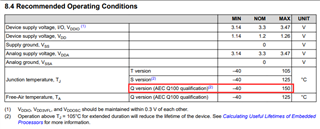I am currently having new design and looking forward to use one of C2000 line processor: TMS320F2837xS.
I looked into the datasheet of TMS320F2837xS, and the temperature rating for the *28377S-Q1 device is shown as -40c to 150C (junction temp) and -40c to 125C (free-air temp), which looks to be matching with the design requirement that I have.
I am wondering if there is any more temperature qualification data related to the processor family. also, is it okay to run the two cores at 200 MHz at 150°C?
Thanks.


